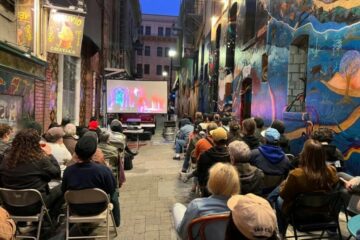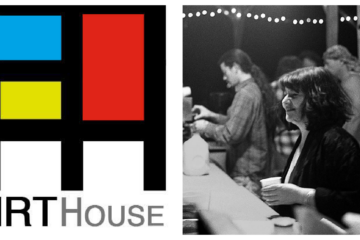The City That Could Be: Looking to the Future
P Segal, Bohemian Archivist, has turned her attention from how great this city used to be to how incredible it could become, if Stuart were mayor.
Some of you may have noticed that I haven’t been writing about the city that was these days. That’s because, at this pivotal point in the city’s history, I am far more interested in what the city is going to become.
It’s seemed remarkable to me that San Francisco, with its wealth of brilliant citizens, history of astonishing innovation, and tons of new money on top of the old, should be having bigger problems now than it ever did before. With all the geniuses and cash we have around, we should be having fewer problems, and not bigger, nastier ones. It is especially remarkable that housing in this city could have reached the crisis stage, just when a former housing activist attained the highest post in City Hall.

Ed Lee City Hall protest (Image courtesy that bizarre Ed Lee biography that an independent expenditure group put on every San Franciscans doorstep during the 2011 election.
The recent news at City Hall has made it clear why things are getting much better for some people in this town, and a whole lot worse for the rest of us. Some of those people we’ve elected and entrusted with protecting our welfare haven’t had our best interests at heart, necessarily. Or, perhaps, just not enough.
Okay, this town has always been a bit crooked. Just 150 years ago, this was the Wild West, full of adventurers, cons, overnight millionaires, and people getting shanghaied on the Barbary Coast. We’ve always known that things were a little wild here, under the surface respectability, and we could turn a blind eye to the shenanigans of the naughty old boy network—because life here was cheap and good for most of us.
The moment arrives when you just have to say, “This has gone too far.” It’s no longer the theoretical American way, of government of the people, by the people and for the people. What we are seeing these days in San Francisco is government of the corporations, by the corporations, and for the corporations, which is an essential component of fascism. We do have some dedicated and well-meaning elected officials here who are trying to keep things real. But there isn’t anything they can do about the back-room deals that never get discussed by the Board of Supervisors.
I recently wrote an article about the horrific shambles of the city tax office. That office collects no taxes from the big corporations invited to set up shop here recently—companies that have dozens of people paid to deal with the city bureaucracy, which has always been something of a nightmare, just because of what it is. But the tax office is full, every single day, of small business owners, people running nonprofits that aren’t even funded yet, and other people who are being treated with what looks like sadistic glee by the tax office bureaucrats.
With a Master’s in psychology, and training in diagnosis, I can see that the tax office breeds psychological problems. While waiting for my own turn at abuse (which is an exasperating, long, inefficient process), I have seen people manifesting signs of anxiety, depression, rage, frustration, and other sorts of diagnosable behaviors. A bleak sense of doom pervades the waiting area. The tax office is not inclined to help citizens, which you’d think would be the point of having government. Their website is dysfunctional, at best—in a city where brilliant websites are produced every other minute.
It is well known that our city government has always been somewhat in the pockets of certain industries. A building inspector once told me that the reason why the building codes of the city change every year is not because they want the city to be safer, but because they want to be sure that there is always work for the construction business.
Clearly, the construction industry is profiting mightily from our current housing crisis. But it is totally possible to construct other kinds of cheaper, cooler, structures a lot more quickly than the behemoths rising in mid-Market. The city, of course, isn’t thinking about any of those options. But I am. We could be fixing the housing crisis before more people are forced to leave this city—easily.
Clearly, we need a government for the people and by the people— which is why I’m supporting Stuart, a poet of the people. A man who is currently broke just isn’t for sale; if he were, he wouldn’t be broke. No one owns him, and he owes no one any favors. While the powers that be will try to maintain the status quo, he can work his own back room deals with projects for the people. There are win-win situations for everyone.
In a new series of columns, I’m going to discuss what good is possible in this city, without changing a hell of a lot in the way it looks, functions, and feels. A new administration with a real love of the city and its struggling citizens could do a lot, and be a harbinger of better government everywhere. This city has always been innovative, and here we have another opportunity to do things better, in the city that could be.
This charming image of the city was designed by Lionheart Designs International, which makes jigsaw puzzles of US cities and states. This is one of them.










